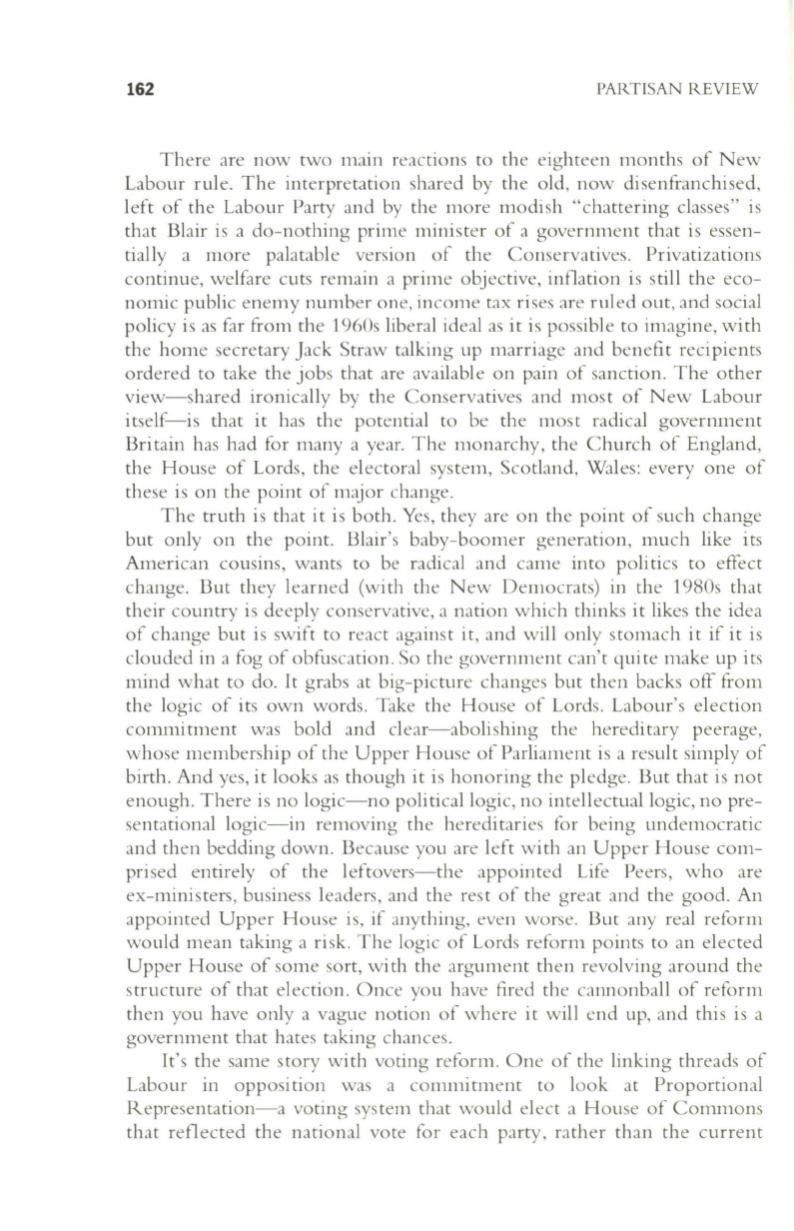
162
PARTISAN REVIEW
There are now two ma1l1 reactions to the eighteen months of New
Labour rule. The interpretation shared by the old, now disenfranchised,
left of the Labour Party and by the more modish "chattering classes" is
that Blair is a do-nothing prime minister of a government that is essen–
tially a more palatable version of the Conservatives. Privatizations
continue, welfare cuts remain a prime objective, inflation is still the eco–
nomic public enemy number one, income t:lX rises are ruled out, ;lI1d social
policy is as far from the 1960s liberal ideal as it is possible to imagine, with
the home secretary Jack Straw talking up marriage and benefi t reci pients
ordered to take the jobs that are available on pain of sanction. The other
view-shared ironically by the Conservatives and most of New Labour
itself-is that it has the potential
to
be the most radical government
Britain has had for many a year. The monarchy, the Church of England,
the House of Lords, the electoral system, Scotland, Wales: everyone of
these is on the point of major change.
The truth is that it is both. Yes, they are on the point of such change
but only on the point. Blair's baby-boomer generation, much like its
American cousins, wants to be radical and came into poli tics to effect
change. But they learned (with the New Democrats) in the 1980s that
their country is deeply conservative, a nation which thinks it likes the idea
of change but is swift
to
react against it, and will only stomach it if it is
clouded in a fog of obfuscation. So the government can't quite make up its
mind what to do. It grabs at big-picture changes but then backs off from
the logic of its own words. Take the House of Lords. Labour's election
commitment was bold and clear-abolishing the hereditary peerage,
whose membership of the Upper House of Parliament is a result simply of
birth. And yes, it looks as though it is honoring the pledge. But that is not
enough. There is no logic-no political logic, no intellectual logic, no pre–
sentational logic-in removing the hereditaries for being undemocratic
and then bedding down. Because you are left with an Upper House com–
prised entirely of the leftovers-the appointed Life Peers, who are
ex-ministers, business leaders, and the rest of the great and the good. An
appointed Upper House is, if anything, even worse. But any real reform
would mean taking a risk. The logic of Lords reform points
to
an elected
Upper House of some sort, wi th the argument then revolving around the
structure of that election. Once you have fired the cannonball of reform
then you have only a vague notion of where it will end up, and this is a
government that hates taking chances.
It's the same story with voting reform. One of the linking threads of
Labour in opposi tion was a commi tment to look at Proportional
Representation-a voting system that would elect a House of Commons
that reflected the national vote for each party, rather than the current


